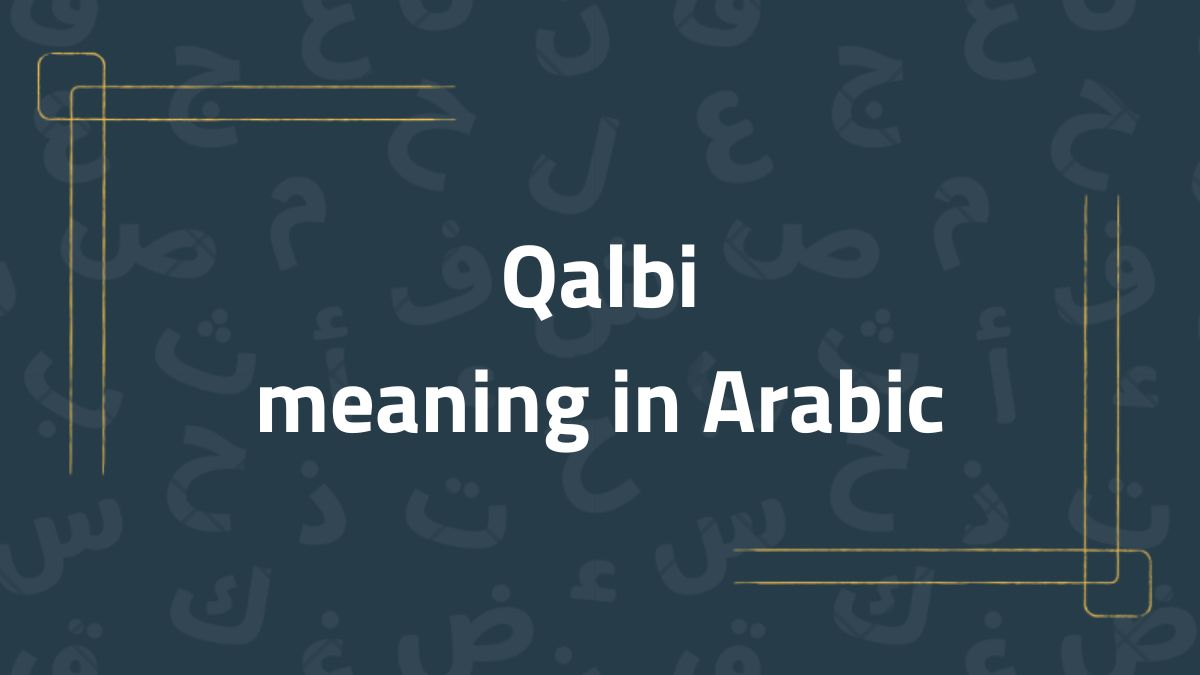The Word "Qalbi" Meaning in Arabic With Examples

The Arabic word “qalbi” (قَلْبِي) holds deep emotional and cultural significance. It translates to “my heart” in English and is commonly used in both daily conversation and poetic expressions. This article explains the meaning, linguistic roots, and cultural importance of “qalbi” and its variations, such as “ya albi” and “alby.”
The Meaning of “Qalbi” in Arabic
“Qalbi” (قَلْبِي) means “my heart” in Arabic. It comes from the root word “qalb” (قَلْب), which means “heart.” The “-i” suffix indicates possession, making it “my heart.”
-
Pronunciation: qal-bee (قَلْبِي).
-
Variations:
-
“Ya albi” (يا قلبي) = “Oh my heart” (term of endearment).
-
“Alby” (قلبي) = A colloquial form of “qalbi” used in dialects like Egyptian Arabic.
-
Linguistic Root and Grammatical Usage
The root of “qalbi” is “q-l-b” (ق-ل-ب), which relates to the heart, emotions, and change (since the heart is seen as the center of feelings).
-
Grammatical Forms:
-
Qalb (قَلْب) = Heart (noun, singular).
-
Qalbi (قَلْبِي) = My heart (possessive form).
-
Quloob (قُلُوب) = Hearts (plural).
-
In Arabic grammar, possession is shown by adding a suffix (-i for “my,” -uka/-uki for “your,” etc.).
Examples of “Qalbi” in Arabic Sentences
-
Arabic: قَلْبِي مَعَكَ.
Transliteration: Qalbi ma’aka.
Translation: My heart is with you. -
Arabic: يا قَلْبِي، لَا تَحْزَنْ.
Transliteration: Ya qalbi, la tahzan.
Translation: Oh my heart, do not be sad. -
Arabic: قَلْبِي يَنْبِضُ لَكَ.
Transliteration: Qalbi yanbidu laka.
Translation: My heart beats for you.
Cultural or Quranic Significance of “Qalbi”
The word “qalb” appears frequently in the Quran, symbolizing the spiritual and emotional center of a person.
-
Quranic Example:
-
Surah Al-Hajj (22:46):
Arabic: فَإِنَّهَا لَا تَعْمَى الْأَبْصَارُ وَلَٰكِن تَعْمَى الْقُلُوبُ الَّتِي فِي الصُّدُورِ
Translation: For indeed, it is not the eyes that are blind, but the hearts within the chests.
-
In Arabic culture, “ya albi” is a common term of affection, often used between loved ones.
Common Misunderstandings or Mistakes
-
Confusing “qalb” and “qalbi”:
-
“Qalb” = Heart (general term).
-
“Qalbi” = My heart (possessive).
-
-
Dialect Differences:
-
“Alby” is informal (Egyptian dialect), while “qalbi” is formal.
-
Why You Should Learn “Qalbi”
Understanding “qalbi” helps in:
-
Expressing emotions in Arabic.
-
Reading the Quran, where “qalb” is a key term.
-
Communicating affection in daily conversations.
Conclusion
The Arabic word “qalbi” (my heart) carries deep emotional and cultural meaning. It appears in the Quran and is widely used in poetry and daily speech. Learning “qalbi,” “ya albi,” and “alby” enhances your ability to express feelings and understand Arabic better. Whether for Quranic studies or conversation, this word is essential for Arabic learners.
Discover the Quran and Arabic with Shaykhi Academy
We highly recommend Shaykhi Academy for anyone seeking to learn the Quran and Arabic with excellence. The academy is known for combining expert teaching with a compassionate approach, making it a top choice for students worldwide who want to connect deeply with the words of Allah.
At Shaykhi Academy, you’ll find highly qualified teachers who specialize in guiding learners of all ages and levels. Whether you’re just beginning your journey with Arabic letters or aiming to master Tajweed and Quran recitation, their personalized lessons ensure steady progress at your own pace.
With engaging classes, flexible scheduling, and a focus on both spiritual and linguistic growth, Shaykhi Academy makes learning both enjoyable and impactful.
Watch a sample class below to see Shaykhi Academy in action:
Learn Arabic, Quran, And Tajweed With Free Trial!
Make your home a place of faith, understanding, and connection with the Quran. Whether you're starting from scratch or deepening your knowledge, Shaykhi Academy is here to guide you — step by step. ✅ Tailored for all ages ✅ Clear, structured learning ✅ Flexible online sessions ✅ Book your free trial session now!
Learn More
